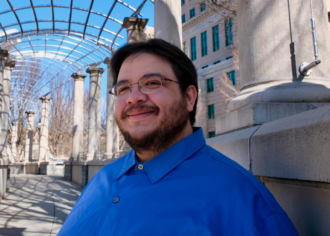Editor’s note: As part of Xpress‘ monthlong Sustainability Series, we reached out to all candidates running for Buncombe County Board of Commissioners as well as Asheville City Council. Conversations with those who participated will appear throughout our four April issues.
“I’ve almost certainly spent more time on the ground cleaning up the waste and garbage of the unhoused crisis than any other candidate,” Charles “CJ” Domingo asserted to Xpress during the March primary. Domingo, a former city employee who now serves as operations supervisor at Securitas Loomis, placed sixth in the race, earning 8% of the overall vote. Come November, this first-time Asheville City Council candidate will be vying for one of three open seats.
Asheville City Council meets on the second and fourth Tuesday of the month at 5 p.m. in the Council chambers located on the second floor of City Hall. The elected body approves the city’s annual budget and determines the tax rate, among other responsibilities. To learn more about Council’s role and authority, visit avl.mx/dkd.
Xpress: What misconceptions do community members have about the role of Asheville City Council?
Domingo: There’s lots of little pockets of misunderstanding that I’ve seen during the campaign, but the one that stuck out to me the most was regarding districts. I’ve encountered many locals who believe that we have Council districts. It’s understandable since that was in the news back in 2018-19 before the city amended the charter, but I found it surprising how many folks have this misconception.
What can local leaders do to promote thoughtful community dialogue about complex and difficult topics such as the opioid crisis, crime, housing and health care?
Fundamentally, these topics strike to the heart of not just our community but the reason folks gather to make communities in the first place. If we could have frank, honest and vulnerable discussions, I believe that the vast majority of us are on board with many of the same goals — we want to heal the hurt and halt the harm. We don’t want people dying prematurely, we don’t want to live in fear. We want people to have a place they call home, we want help for the sick, we want people to have the chance to thrive. If we talk to our fellow Ashevilleans, we will realize we all want to go to essentially the same places, but we don’t agree on how to get our community there.
The problems we face have national roots (similar issues can be found all over the country) with local factors (unique extra challenges but also special opportunities to take bites out of the problems). These are multifaceted issues, but the conversations to solve them can be very different, depending on where it’s happening and who is having it. The discoveries and insights one group makes might not get shared. Unfortunately, when the truth is siloed, we can find ourselves trying to solve the jigsaw without all of the pieces.
So, if there is to be meaningful progress toward solutions, I would encourage local leaders to promote cross-pollination. We need to reach across the gaps between neighborhoods, across industries and between social groups to talk to folks older and younger than ourselves and ask what they can teach us. When we can bring everyone’s expertise and multiply it through the community, it will enrich the conversation and help all of us to better understand where we are and which steps we can take to achieve our mutual goals. If we have these conversations with humility and honesty, we will see that even if the path our community takes is not our personal ideal, it can still be acceptable because in this journey we care most about the destination.
What can the city and county do to help small businesses thrive?
Small businesses depend on having a thriving middle class that has the time, money and access to come patronize their establishments. Making progress on affordability, promoting good work opportunities, safeguarding infrastructure and ensuring transit options will provide fertile ground for small businesses to thrive. To ensure that we can have a variety of small businesses, local governments will need to play the role of a gardener inasmuch as discouraging the weeds (e.g., large brands) from choking out opportunities. Continuing the analogy, we want to be wary of monoculture — our tourism and health care industries are what we’re known for, and we’re blessed to have them, but we must not sacrifice a healthy ecosystem (both figuratively and literally) to placate their demands.
If you could give raises to one city department, which department would you like to see receive it and why?
Having worked for the city and knowing how hard each department strives to do their best for the people of Asheville, I find it nigh on impossible to answer this question in a direct way. I would instead seek to invest in the continued education and growth of the employees in public-facing departments to help them as they serve to make Asheville a place worth living, not just visiting.
To learn more about Domingo visit avl.mx/dkh.






Occupation? experience? not much energy here…like zero.